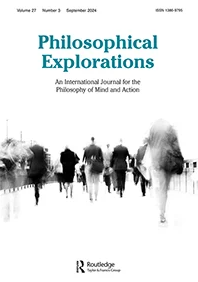
Chi-keung Chan
Philosophical Explorations, February 2025, 1–19.
Abstract: This article offers a novel interpretation of enacted knowledge through the lens of Wang Yangming’s theory of the unity of knowledge and action. By framing Wang’s concept of knowledge within an enactive model, it advances a holistic perspective that integrates mind, body, and world, as well as knowledge and action, into a unified whole. To bridge historical analysis with contemporary philosophical discourse, this article engages in dialogue with Harvey Lederman’s introspective model, offering a complementary framework that, together, provides a more precise and comprehensive understanding of Wang’s philosophy. Moving beyond Lederman’s dichotomy of correspondence and identity, I introduce a third interpretation of ‘unity’: the Continuum Thesis. This interpretation places a more fundamental focus on the original condition of moral knowledge, presenting it as a singular entity that inherently integrates the distinct aspects of knowledge and action. By asserting that ‘action just is knowledge’, Wang indeed affirmed their original unity.
About the author: Chi-keung Chan was a HYI Visiting Scholar from 2022-23.
